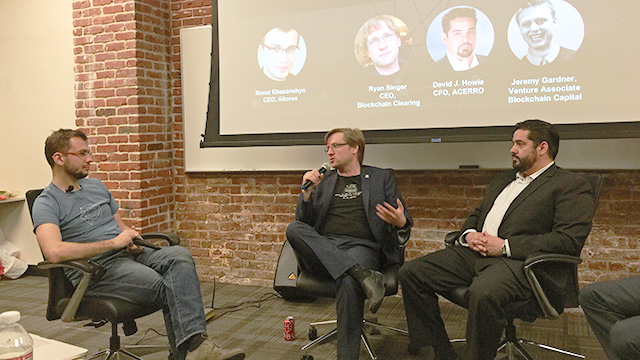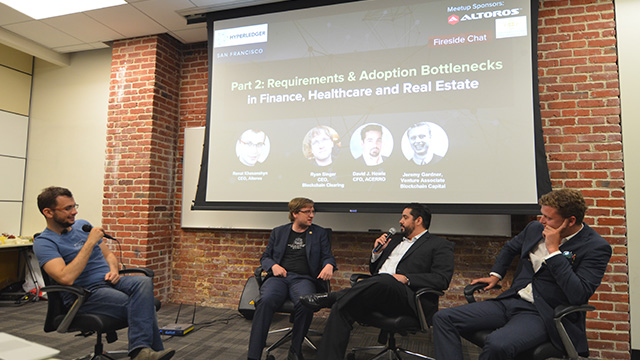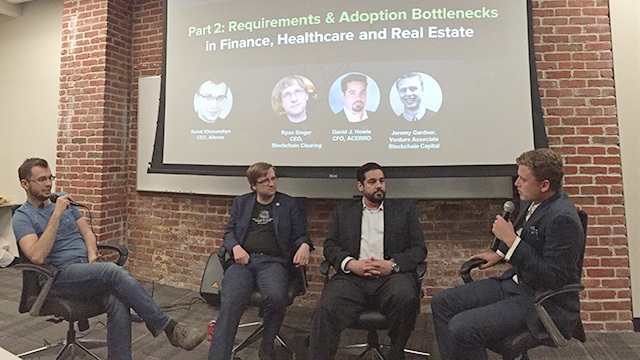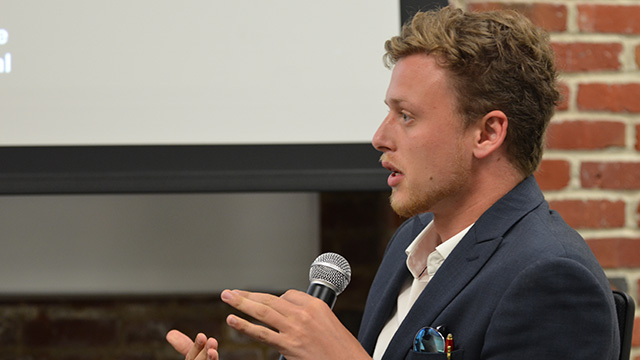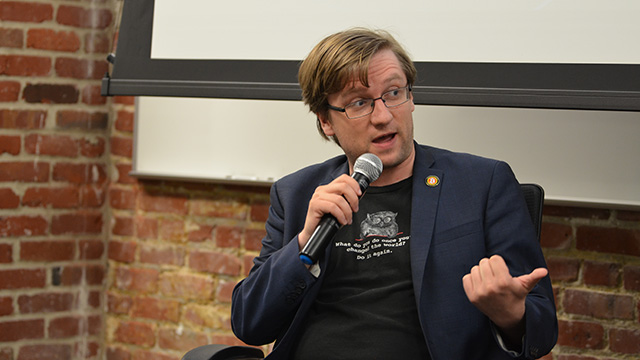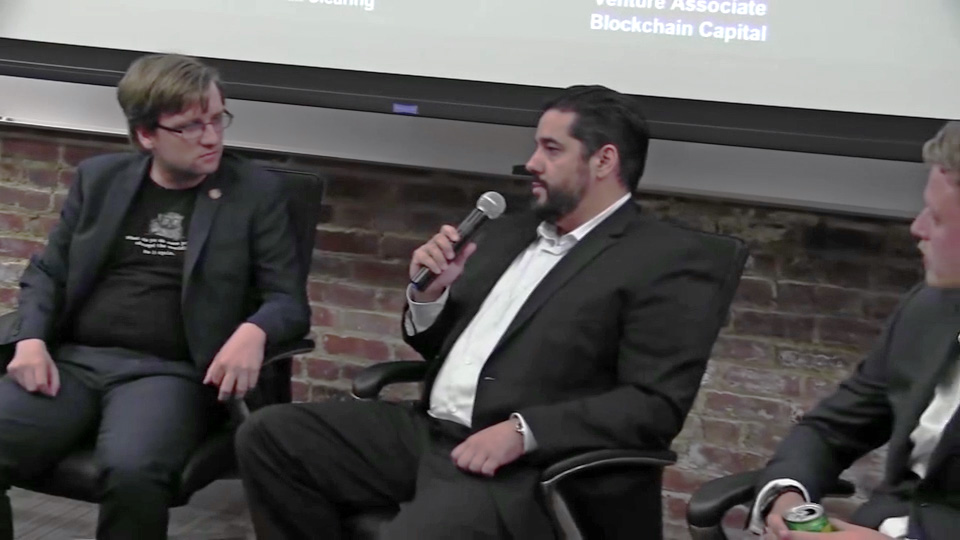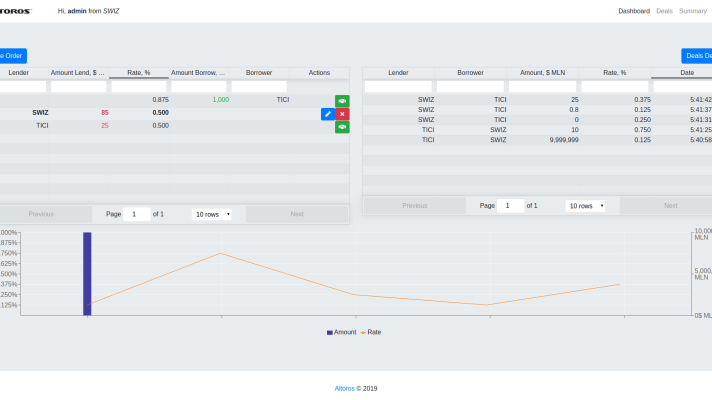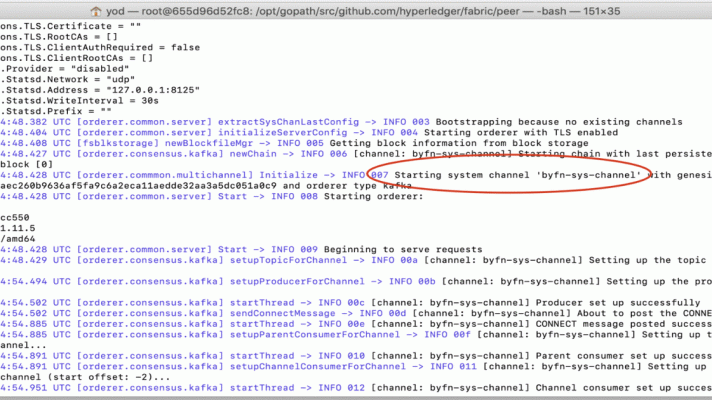Hyperledger Requirements and Adoption Bottlenecks in Finance and Real Estate
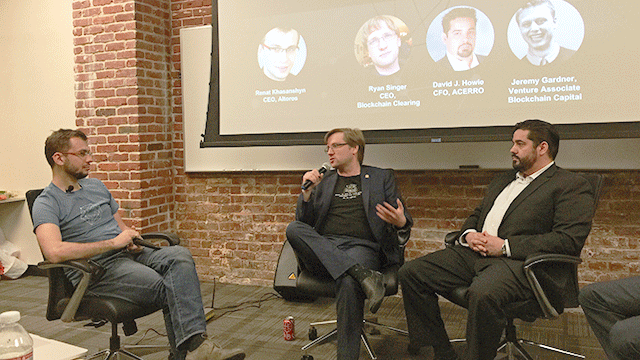
Renat Khasanshyn, CEO at Altoros, led a fireside chat discussion about the requirements and adoption bottlenecks for blockchain in real estate and finance. The speakers included Blockchain Clearing’s CEO Ryan Singer, ACERRO’s CFO David J. Howie, and Blockchain Capital’s Venture Captalist Jeremy Gardner. The event was hosted by the University of San Francisco’s School of Management.
Clearing up the blockchain confusion
Renat begins the discussion by asking each of the speakers about their individual experiences with blockchain technology.
“I’ve only been involved with open source since 2002,” says Ryan Singer. “Looking at what clients have been talking about, there’s a lot of confusion among everybody about what blockchain is and why they want to have a blockchain strategy and what it means to have a blockchain strategy.”
“I feel like a lot of this confusion has deliberately been encouraged by the press.”
—Ryan Singer, CEO, Blockchain Clearing
Ryan explains his statement by going back to the very origin of blockchain, which is Bitcoin.
When Satoshi Nakamoto, creator of Bitcoin, released the white paper, it “introduced Bitcoin as an e-money system with the blockchain concept as a way to be able to tell what can be for what and then choose blocks as the way to order transactions.”
“If you search the Bitcoin white paper for the term blockchain the way it’s commonly styled with no space, you’re not going to find it.” —Ryan Singer, CEO, Blockchain Clearing
Ryan adds to the explanation further with an analogy between the creation of DNS and the creation of blockchain stating, “I like describing it like BIND in DNS, where DNS was not a thing people designed. People designed BIND, a software for being able to resolve the differences in IP addresses and DNS emerged as a standard in the same way that ‘IBM compatible’ emerged as a standard.”
“If your software could interact with BIND then it was good enough for DNS. In a lot of ways, if your software can interact with Bitcoin Core then it was good enough for Bitcoin which a lot of people call the blockchain,” says Ryan. “There was never a technical standard first. The press, in their attempt to run away from Bitcoin as fast as possible, have created a false myth that has basically penetrated everybody who says they want a blockchain strategy that doesn’t allow Bitcoin to transact with it.”
Blockchain in real estate
Renat follows up on the initial experience thread with David J. Howie and how blockchain technology factors in or can be a factor in real estate.
“I’ve been following the blockchain space for a little bit now so I’m still learning,” says David. “How I can kind of see it trickling into my industry is that [real estate] is highly regulated.
In real estate, there’s not just one license you need to have to be able to practice. You have to have a license if you want to practice in a particular jurisdiction. You have to have a license if you want to practice in multiple areas within a state.
“There’s a lot of inefficiencies in that area alone,” explains David. “There’s actually a movement going on right now where the National Association of Realtors is trying to form one centralized MLS (Multiple Listing Service).”
“Right now, there’s about 400 MLS which is crazy. I see a lot of blockchain applications in there.” —David J. Howie, CFO, ACERRO
Another area in real estate that could use blockchain is in the title insurance business, “where 12B USD was spent in the US alone.”
“Essentially what you’re paying for is the labor and the research making sure there is no fraud in your chain of title and that the person who’s conveying the title to you and selling the property is actually able to do that,” says David. “I think the blockchain is definitely an interesting use case.”
Early stumbles for blockchain
Asked the same question, Jeremy Gardner relayed his experience with blockchain.
“I was one of the first people who thought the blockchain was really going to captivate people and sure enough that’s really the evolution we’ve seen because it enables more than just money,” says Jeremy. “As Ryan said, that was never the original intention—the word blockchain never shows in the original white paper. I think this is a healthy evolution.
“There’s going to be a lot of stumbling early on as people start to play around with this technology.” —Jeremy Gardner, Venture Capitalist, Blockchain Capital
Jeremy points out that the top companies aren’t that far ahead when it comes to blockchain technology. “We talk to Fortune 100 companies all the time and they don’t really know [what’s going on] and that’s fine. They’re going to learn, but I think at the end of the day, we’re going to find that the use cases for the blockchain are slightly more limited than we think they are now and in other ways it’s going to be far more expansive as we dig deeper into the technology.”
Requirements for blockchain use cases
Moving on to use case requirements, Renat asks the group regarding their take on rules or formulae that would apply to potential blockchain use cases.
- Blockchain solutions need to be 10x better than the current solution in the world of venture capital.
- Communicate with the experts of whatever industry is being disrupted.
- Find markets where much of the power is captured by an anti-innovation gatekeeper.
- Look for technology in that market has not being keeping pace with technology in general.
- Industries that don’t use the cloud.
- Industries that have to insure against matters of fact.
- Industries where there’s an arbitrary rule of man instead of rule of law keeping people out.
“It has to be 10x better because it’s so fundamentally disruptive to traditional business processes and if your solution is not exponentially better that what is currently provided, there’s no way large enterprise customers are going to adopt.” —Jeremy Gardner, Venture Capitalist, Blockchain Capital
“What you’re looking for are scenarios where the market is suffering as a result of the gatekeeper and decentralizing the trust and disintermediating that gatekeeper will create such amazing value that people would rather join this open market than do the much easier thing of working with the current infrastructure.” —Ryan Singer, CEO, Blockchain Clearing
An existing blockchain use case
As an example use case, Ryan brings up Bitpagos, a company that helps merchants in Argentina take foreign credit cards which they then pay out in Bitcoin.
“The gatekeeper for the Argentinian banking system basically completely isolates Argentinian business people from the world altogether and completely controls them and causes incredible social damage,” says Ryan. “So by cutting that out, giving it a more reasonable regulatory scheme and then just pushing the Bitcoin which the gatekeepers can’t control creates incredible amounts of value.”
Real estate blockchain limitations and a way forward
The escrow companies act as the gatekeepers in the world of real estate. They are regulated by the patriot act and anti-money laundering policies.
“You can’t use Bitcoin currently to buy real estate. You have to use US dollars,” says David. “That’s a challenge in my industry, so besides using blockchain as an asset class for payment, I think blockchain can be used in other ways.”
As mentioned before, there are about 400 different MLS in real estate. MLS are private companies that associate with a global association of realtors.
“There’s this movement to put them all together and have one central MLS,” says David. “With the Hyperledger Project and the whole permissioned [network] built into it, that’s perfect for this industry because you have to have a license, so there has to be some kind of authentication.”
Blockchain requirements and adoption bottlenecks
The requirements for adoption of blockchain in the varying industries boiled down to these few key factors:
Expert knowledge. You need to know the business that you’re working on at least having advisors that actually know whatever industry you’re trying to start a company in.
“You need to know the laws in order to make sure that you don’t break them and in order to innovate around them.” —Jeremy Gardner, Venture Capitalist, Blockchain Capital
Connections. You need to know the right people you need to lobby your solution to.
“The more powerful the gatekeeper is, the more legitimate economic activity they’re preventing.” —Ryan Singer, CEO, Blockchain Clearing
- Most disruption. Seek out the most regulated markets and the most powerful markets then find a way to play a different game.
- Regulation. Regulation needs to change to allow the use of different technology or new tools that make the process run faster.
“Even if you do a 30 day escrow or 7 day escrow on cash, it’s still going to take time for all these different things to happen. Speeding up that process is going to add value so there’s a lot of room for innovation.” —David J. Howie, CFO, ACERRO
Want details? Watch the video!
Table of contents
|
Related reading
- Hyperledger/Blockchain Requirements and Adoption Bottlenecks
- Hyperledger Fabric: Industry Use Cases and Requirements
About the speakers



